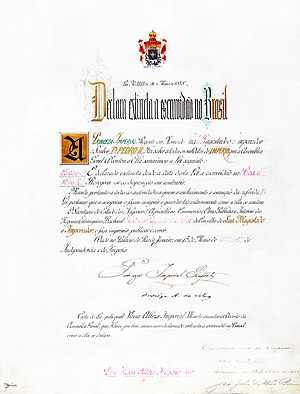Golden Law
| Lei Áurea Golden Law |
|
|---|---|

Manuscript of Lei Áurea
|
|
| Lei Imperial n.º 3.353 | |
| Territorial extent | Brazil |
| Enacted by | Senate of Brazil |
| Date passed | 12 May 1888 |
| Date enacted | 13 May 1888 |
| Signed by | Isabel, Princess Imperial of Brazil |
| Introduced by | Rodrigo Augusto da Silva |
The Lei Áurea (Portuguese pronunciation: [ˈlej ˈawɾiɐ]; English: Golden Law), adopted on May 13, 1888, was the law that abolished slavery in Brazil. It was signed by Isabel, Princess Imperial of Brazil (1846–1921), an opponent of slavery, who acted as regent to Emperor Dom Pedro II, who was in Europe
The Lei Áurea was preceded by the Rio Branco Law of September 28, 1871 ("the Law of Free Birth"), which freed all children born to slave parents, and by the Saraiva-Cotegipe Law (also known as "the Law of Sexagenarians"), of September 28, 1885, that freed slaves when they reached the age of 60.
The text of the Lei Áurea was brief:
Art. 1.º: É declarada extinta desde a data desta lei a escravidão no Brasil.
Art. 2.º: Revogam-se as disposições em contrário.
(Article 1: From this date, slavery is declared abolished in Brazil. Article 2: All dispositions to the contrary are revoked.)
The succinctness of the law was intended to make clear that there were no conditions of any kind to the freeing of all slaves. However, it did not provide any support to either freed slaves or their former owners to adjust their lives to their new status: slave owners did not receive any state indemnification, and slaves did not receive any kind of compensation from owners or assistance from the state.
Before the abolition of slavery, slaves were prohibited from owning assets or receiving an education; but after being freed, former slaves were left to make their own way in the world. Without education or political representation, slaves struggled to gain economic and social status in Brazilian society.
The Lei Áurea was authored by Rodrigo A. da Silva, then Minister of Agriculture (in the Cabinet headed by Prime Minister João Alfredo Correia de Oliveira) and member of the Chamber of Deputies, and, after passing both houses of the National Assembly (Assembléia Geral), it was sanctioned by Isabel, Princess Imperial of Brazil (1846–1921), who was Regent at the time, while her father, Emperor Dom Pedro II, was in Europe. The Golden Law was signed by the Princess Imperial and countersigned by Rodrigo A. da Silva, in his capacity as Minister of Agriculture. Princess Isabel (who was a staunch supporter of the abolitionist movement) was awarded the "Golden Rose" by Pope Leo XIII and Minister Rodrigo A. da Silva received honors from the Vatican, France and Portugal. In August 1888 Rodrigo A. da Silva went on to be chosen for a lifetime seat in the Senate of the Empire.
...
Wikipedia
